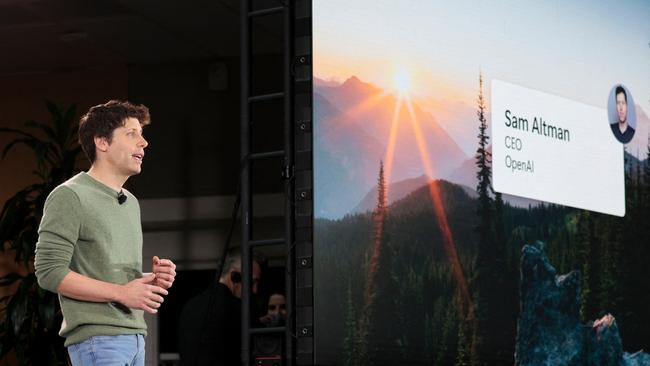Microsoft adds ChatGPT AI technology to Bing search engine
The technology giant is integrating the technology behind the viral chatbot ChatGPT into its Bing search engine, in a bid to chip away at Google’s dominance of the search market.

Microsoft is integrating the technology behind the viral chatbot ChatGPT into its Bing search engine, hoping the artificial intelligence upgrade can help it chip away at Google’s dominance of the search market.
The breakout success of the bot from the Microsoft-backed OpenAI has put the software giant at the forefront of what some see as the next wave of technological innovation: generative artificial intelligence.
In an event Tuesday to launch the technology, Microsoft said the Bing upgrade will enable a new kind of search in which people will pose questions to the search engine in natural language and it will generate direct answers and suggestions.
“I think this technology is going to reshape pretty much every software category,” Microsoft chief executive Satya Nadella said at the event at the company’s Redmond, Washington, headquarters.
Mr Nadella put the significance of AI-powered search on the same level of importance as the development of web browsers and mobile devices.
Unlike ChatGPT, which wasn’t able to answer questions about current events, the updated Bing uses newer technology tailored for search engines. It will have access to the latest information such as news stories, train schedules and product pricing. It will also be able to provide links to demonstrate where its answers are coming from, another feature that wasn’t part of ChatGPT.
Microsoft shares, which have climbed around 17 per cent over the last three months compared with a rise of 14 per cent of the Nasdaq Composite Index, were up around 4 per cent on Tuesday.
Microsoft, which is investing billions of dollars into OpenAI, is integrating the technology into many of its products, marking what it pitches as a new era of AI-powered software that has the potential to upend power in the tech industry. Some analysts say AI-powered searches could help Microsoft’s Bing search engine take market share away from Alphabet Inc.’s Google, which controls around 90 per cent of the market.
The industry has been buzzing about the possibilities of generative AI since OpenAI released its image generation tech Dall-E 2 to the public last year. Dall-E 2 can create original images based on simple prompts, such as, “Draw a robot dancing in a field of flowers.” OpenAI released ChatGPT in November. Millions of people have since used it to generate essays, sales pitches and poems.
The popularity of the tools has put pressure on Google, which has long been at the forefront of AI technology, to match it.
Earlier this week, Google announced it is rolling out its own conversational artificial-intelligence service to a set of testers and plans a broader public launch in the coming weeks. The new experimental service, called Bard, generates responses to questions posed by users, based on information drawn from the web, Sundar Pichai, chief executive of Google parent Alphabet, said in a blog post published Monday.
Shares of Chinese internet giant Baidu Inc. surged in Hong Kong Tuesday as it confirmed plans to launch an artificial-intelligence chatbot. Baidu said it expects to launch its AI chatbot, called Ernie Bot, in March.
Some artificial intelligence analysts warn there are still potential problems with generative AI. ChatGPT, for example, can be expensive to run and slow, and it sometimes produces responses that contain made-up facts, they have said.
OpenAI CEO Sam Altman was at the Microsoft event, saying the new uses for AI technology mark the “beginning of a new era.” In the past he has warned that it is still evolving and prone to inaccuracies.
Mr Altman said both OpenAI and Microsoft are taking a cautious approach in how they roll out the technology, trying to take measures to ensure that Bing won’t generate dangerous or offensive content.
“We share a deep sense of responsibility in ensuring that AI gets deployed safely,” he said.
The technology is proving powerful in some cases, such as when it is paired with professionals for specific tasks. Last year Microsoft released GitHub Copilot which uses OpenAI tools to help programmers write and fix computer code. Microsoft estimated that in files in which it is enabled, Copilot generates 40 per cent of the code. The company last year also integrated OpenAI’s image-generation tech into its Bing and graphical design software Microsoft Designer.
The latest applications of the technology to Bing as well as Microsoft’s Edge browser are aimed at creating similar partnerships between people and AI, Mr Nadella said.
“You’re going to have this notion of a co-pilot that’s going to be there across every application,” he said.
As small startups and big corporations dive into using more of the data-heavy technology, Microsoft’s Azure cloud-computing business could benefit. Microsoft’s attempts to lead the shift to generative AI helps position Azure as the platform best suited for the job.
The Wall Street Journal



To join the conversation, please log in. Don't have an account? Register
Join the conversation, you are commenting as Logout